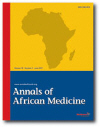
|
Annals of African Medicine
Annals of African Medicine Society
ISSN: 1596-3519
Vol. 4, Num. 1, 2005, pp. 43-43
|
Annals of African Medicine, Vol. 4, No. 1, 2005, pp. 43
PREVALENCE OF MALARIA AMONG HIV/AIDS PATIENTS AT AHMADU BELLO UNIVERSITY TEACHING
HOSPITAL, KADUNA, NIGERIA
1R. N. Eni, 2P. O. A. Ogbechie
and 3A. Ibrahim
Genito- Urinary Medical Clinic, General Outpatient Department, 2 Departments
of Haematology and Blood Transfusion, and 3Medicine, Ahmadu Bello
University Teaching Hospital, P. M. B. 2016, Kaduna, Nigeria
Code Number: am05012
Dear Editor
Human immunodeficiency Virus (HIV) has continued to rise worldwide.
Malaria infection has increased the disease burden, which inspired the recently
Roll-Back Malaria African Conference in Abuja Nigeria in year 2000. The epidemiology
of HIV/AIDS has been increasing in Nigeria. 1-2 Epidemiological
data on prevalence of malaria and on HIV/AIDS/ in Nigeria is scanty. The prevalence
of malaria in adults with HIV/AIDS in Kaduna is not known. We have set out
to
investigate the prevalence of malaria in adults affected by HIV/AIDS in Kaduna.
This investigation was carried out at the Genito-Urinary Medical (GUM) Clinic
of ABU Teaching Hospital Kaduna Nigeria. The patients for the study were those
who fulfilled the following criteria:
- 18
to 50 year.
- Males and non-pregnant
females
- Newly diagnosed patients with
HIV-1
- HIV-1 patients that have not
taken anti-malaria treatments in the preceeding 7 days
- HIV –1 patients not on anti-retroviral
drugs.
There were 140 patients (70 males and 70 females). The duration of study was
February - June 2001. Blood samples were obtained by venepuncture from all
the patients and investigated for malaria parasites (MPs) and HIV antibodies.
Of the 140 patients, 98 (70%), consisting of 56 males and 42 females were
positive for malaria parasite. Statistical analysis did not show a significant
gender difference (p=0.48).
The age group 23-27 years accounted for 25.51%, 28-32 years 19.38% and 33-37
years 16.32%. The three age groups accounted for 61.21% of all positive MPs
followed by 38-48 years with 18.36%.
The study showed that 70% of HIV-1 positive patients have concurrent
malaria parasitaemia compared to malaria parasitaemia in normal adults and
children, which are 22.5% and 57.55% respectively in studies elsewhere. 3 This
higher prevalence of malaria parasitaemia due to immunological factors. Malaria
infection in humans involves specific response of malaria-specific CD4 + Th1
and Th2 subjects of lymphocytes especially in Plasmodium falciparum,
which is predominant in Nigeria. Other cytokines are involved in hepatic stages
of P. falciparum infection,
which has acted as suppressor of the anti-inflammatory cells. These effects
lead to short-term immune suppression. The added immune deficiency due to Human
Immunodeficiency Virus Infection explains the high prevalence of malaria infection
in HIV patients as indicated by our study. In HIV infection there is down modulation
and reduction in CD4+T- cell sub-population and defective cell mediated immunity.
Our investigation did not reveal any gender difference in the infectivity
of malaria on HIV persons. Other studies on malaria infestation have not revealed
any gender bias. 4 Several control, preventive, and treatment measures
have been targeted at the age groups most affected. 5 We recommended
that patients living with HIV/AIDS be placed on malaria prophylaxis.
References
- Mukherjee JS, Farmer PE, Niyizonkiza
D et al. Talking HIV in resource poor countries. Br Med J (West African Edition)
2004:7:54-56
- Akinsete I, Njoku OS, Okanmy
C et al. Management of HIV infection in Nigeria with Zalcitabine in combination
with saquinavir mesylate: preliminary findings. West Afr Med J 2000; 19:
265-258
- Salako L, Edigbe EO, Erinosho
MA et al: Malaria and Human Immunodeficiency Virus (HIV) infection among
adults in Ogun State, South Western Nigeria. Nigerian Quarterly Journal of
Hospital
Medicine 1996; 279-283
- Ogbe MG. Eradication of parasite
diseases. Prospects and problems. Nigerian Journal of Parasitology 1999:
20 –25
- Yamey G. Roll Back Malaria: a
failing global health campaign. Br Med J (West African Edition) 2004; 7:
107-108
Copyright 2005 - Annals of African Medicine
|
